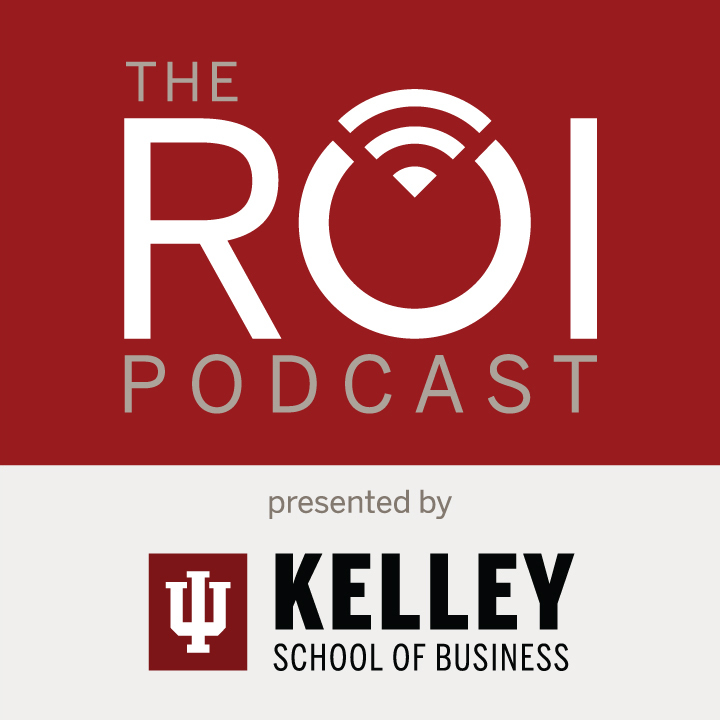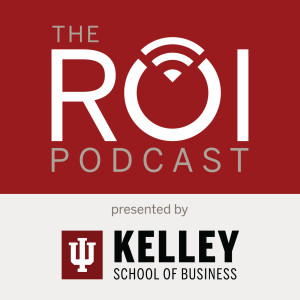
Healthcare costs continue to increase, but physicians are becoming more involved with the business side of healthcare. In this episode of The ROI Podcast, Associate Professor of Strategy and Entrepreneurship Todd Saxton discusses SoPe, Indiana's Chapter of the Society of Physician Entrepreneurs, and how its goal is to create more entrepreneurial physicians.
----
Do you have a question? Looking to get help on a business decision? Know a great guest for our show? Email roipod@iupui.edu so we can help your organization make better business decisions.
----
Ready to take your next step? Check out if a Kelley MBA is right for you: https://bit.ly/3m2G6D5
----
Show Notes:
Shane: "Doctors are going to have to start thinking about the broader business, which is something they haven't really been pushed to do before. If they want to continue to contribute to the organization and understand how they fit in, they need to understand how they're contributing to the economic vitality of the organization." Those are powerful words regarding the future of physicians in this country, spoken by our guest today – Todd Saxton – professor of strategy and entrepreneurship at the Kelley School of Business. And today – we're talking about an initiative that could impact everyone's healthcare in this country.
(The ROI Podcast Intro Music)
Shane: Welcome back! Here we are with another ROI Podcast coming at you from the Kelley School of Business on the downtown Indianapolis campus. I'm your host Shane Simmons and as usual, Phil Powell, who's the associate dean of academic programs at the Kelley School, is right beside me. Phil – how's it going?
Phil: (Response)
Shane: Today, many people's minds are going to be amazed – because we're talking about something that touches us all: healthcare.
Phil: Get this, in 2016, $3.3 Trillion was spent on healthcare expenses, according to Centers for Medicare & Medicaid Services. That's a massive number that continues to rise... And who is going to play a critical role in the future of healthcare in this country? Physicians. And our guest, professor Todd Saxton, says physicians are beginning to, and need to, engage more in the entrepreneurial world.
Todd: One of the things that I think is very interesting to me, now [that I've been] observing our roughly 200 folks up close and personal that have been through our program, is physicians are extremely entrepreneurial - I would put 75%+ of them in the top 10% percentile in terms of entrepreneurial thinking [on] how they approach their own clinical practice.
Todd: I see them engage in the entrepreneurial world in three different ways: One is the physician entrepreneur who wants to start their own thing - we've had several students who've started their own business in the course of attending their own program and are now doing great things as alums. There are the physicians who want to be involved in the venture community as angel investors and or advisers - we've actually had a group formed in conjunction with the program called Angel Bomb that is an angel investing group with Vision Tech, and again, some of the physicians aren't necessarily ready to leave their day job and start a new thing, but want to be active in the community and give back, and that's a tremendous benefit to innovators that are trying to access clinicians not just for their money, but the insight they have in life sciences and the ability to bring that to bear on the start-ups and help them move toward a successful trajectory is really powerful. The third category isn't necessarily interested in starting their own thing, investing, or advising, but are innovators within their own institutions. Innovating in healthcare is really tough and I think some of the lessons they learn, partly from their colleagues, partly from the faculty in the program, allow them to become more successful change agents within their own organizations and institutions.
Phil: Five years ago, here at the Kelley School, we launched one of the few physician-only MBA programs - we were told physicians wouldn't go back to school [because] they were too busy. But they're coming back, and we're enjoying them in the classroom right now. And generally speaking – these physicians tend to think differently than your traditional entrepreneur... But Todd and Dr. Paul Szotek have co-founded something called SoPe – Indiana's chapter of the society of physician entrepreneurs... He says it's leading a step in the direction of creating an ecosystem for physicians here in the Indianapolis region, can you talk about that?
Todd: SoPe's mission is to bring together pieces of the life science venture ecosystem to allow innovation to happen, whether that's entrepreneurship or innovation within hospital systems. It's not clinician-only, it can be other parts of that life science ecosystem, whether you're a care provider or a supporter of life science types or organization - it's a fairly inclusive organization with 50% [of the members being] physicians and there's a strong element of the physician entrepreneur that is trying to be served. I like to think of it in terms of degrees of separation: between any entrepreneur with an idea and success are probably five key people that they need to talk to and get feedback from, [which] will lead to customers and other things. For most clinicians, they are probably three to four degrees of separation, if not more, from those folks that really need to talk to [them] to be successful as an entrepreneur. What SoPE does, and what the Kelley school can enable, is to shorten those degrees of separation to one or two.
Phil: So Shane, when I was talking to Todd about physicians and their entrepreneurial journey, he brought up something about how physicians are trained in med school, and some of the major hurdles they face when they take that entrepreneurial leap.
Todd: In addition to the fact that they're all very bright and motivated, they think scientifically, that's how they've been trained to make diagnoses in most cases of complex scenarios, and take apart and diagnose what's going on - in their world, that's been with a patient who has some kind of problem. In the start-up world, what you're trying to do is frame some hypothesis about the marketplace, what the problem is, what the solution might look like, what pricing might look like, etc., and systematically navigating that uncertainty by framing hypotheses, testing those, and then move onto the next stage - physicians just naturally think that way.
Phil: We're going to pause here for just a second... And pay close attention to what Todd says next.
Todd: It's funny because sometimes, particularly in the tech transfer world and universities, you'll hear we need to train our technologists and researchers to think more like business people – 9:04 I would actually flip that and say we need to train our entrepreneurs to think more like scientists, to think about the problem, craft hypotheses, and systematically navigate through that, as opposed to engaging in entrepreneurship as a random journey.
Phil: But one challenge some physicians face, according to Todd, is that they typically are trained not to take risks... But once they can overcome that challenge – they can accomplish amazing feats.
Todd: There's no recipe for being a successful entrepreneur, and I would say one lesson is to get feedback early: the traditional approach to entrepreneurial education was we're going to get these students, they're going to write a business plan, and have a business plan conference. It was all contained within the walls of the university, no interaction with the marketplace. Ventures that start with a closed-door mentality 30:53 doesn't fly, you need input from the marketplace and you need to reach out to customers and other informed folks who can give you candid feedback. So step one, plan on a lot of iterations in the idea phase when you're coming up with the concept, interact with the marketplace, get feedback, and be comfortable with pivoting. Lesson two is you have to be passionate about the problem that you're solving: a lot of entrepreneurs are enamored with the idea of making a lot of money and inventing the next sliced bread but don't really have a committed to an idea or the problem it is that they're solving. Those entrepreneurs are very rarely successful, so you have to find a problem or know of one that you are passionate about and committed to solving. The third lesson I would say is to get education, whether that's formal or not - coming back to the batting average or hit-rate mentality, the more education you can have the different pieces of uncertainty, how to navigate that, and [being] more informed about the choices that you're making, the more likely it is that your venture will survive the very rough seas of launch and sailing to your destination.
(Closing Music)
Phil: Entrepreneurship can be a scary journey – that's the reality... But out of this risk, can breed massive reward... And with our healthcare moving forward – we need physicians steering the ship – both as clinicians treating their patients – and administrators with the vision of making our healthcare system better than it's ever been.
(Closing ROI Podcast Music)
Shane: Great job on that interview with Professor Todd Saxton... As we say here at the Kelley School: We're changing healthcare one physician at a time – and that's why the society of physician Entrepreneurs' chapter in Indiana is so important. If you'd like to learn more about SoPe, and receive more information about the inaugural event on June 21 – visit www.sopein.com and you can find out all the information there. And don't forget subscribe and leave a review to The ROI Podcast! We'll be back here again with you next week here on the ROI Podcast!
More Episodes
Create your
podcast in
minutes
- Full-featured podcast site
- Unlimited storage and bandwidth
- Comprehensive podcast stats
- Distribute to Apple Podcasts, Spotify, and more
- Make money with your podcast
It is Free
- Privacy Policy
- Cookie Policy
- Terms of Use
- Consent Preferences
- Copyright © 2015-2024 Podbean.com







